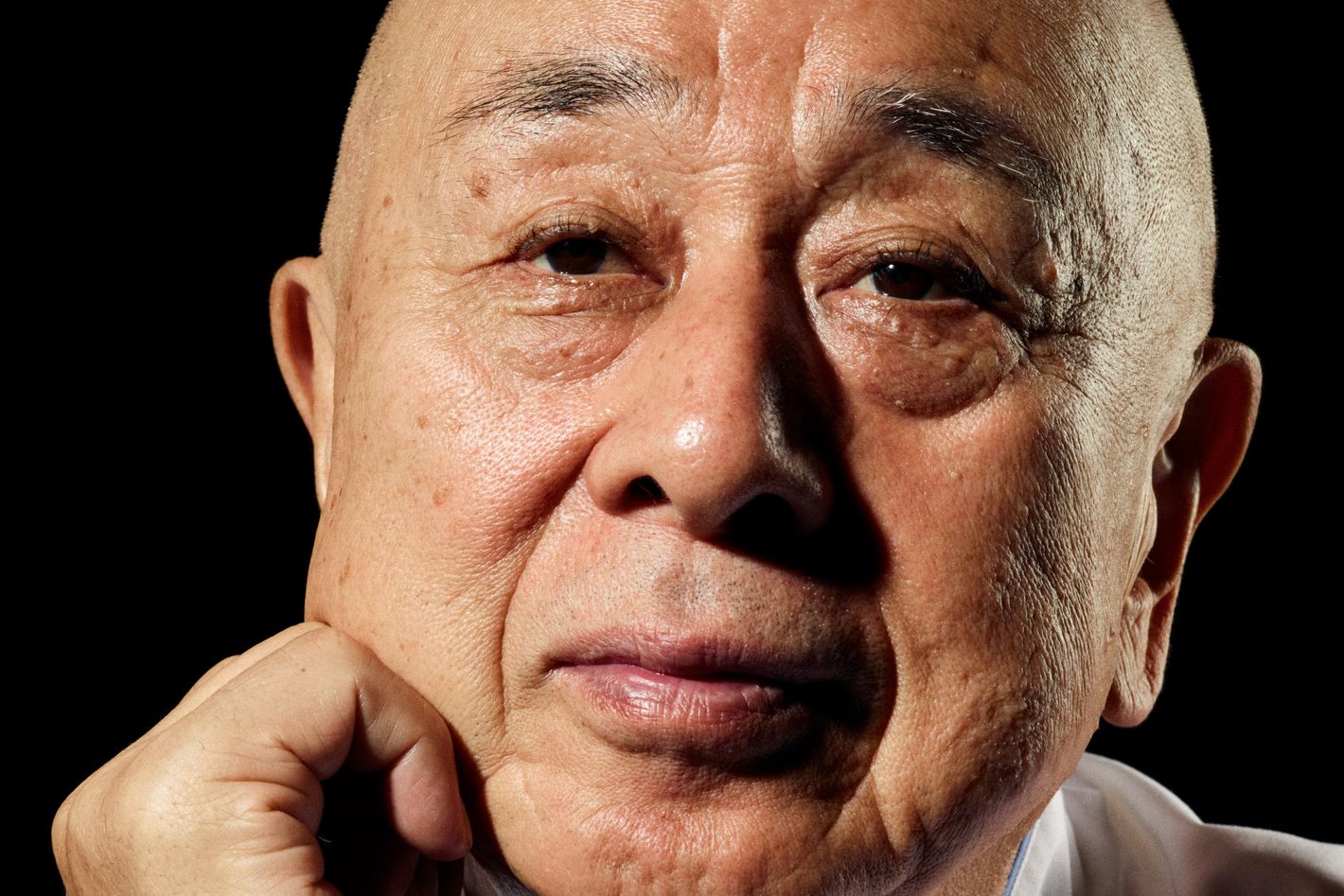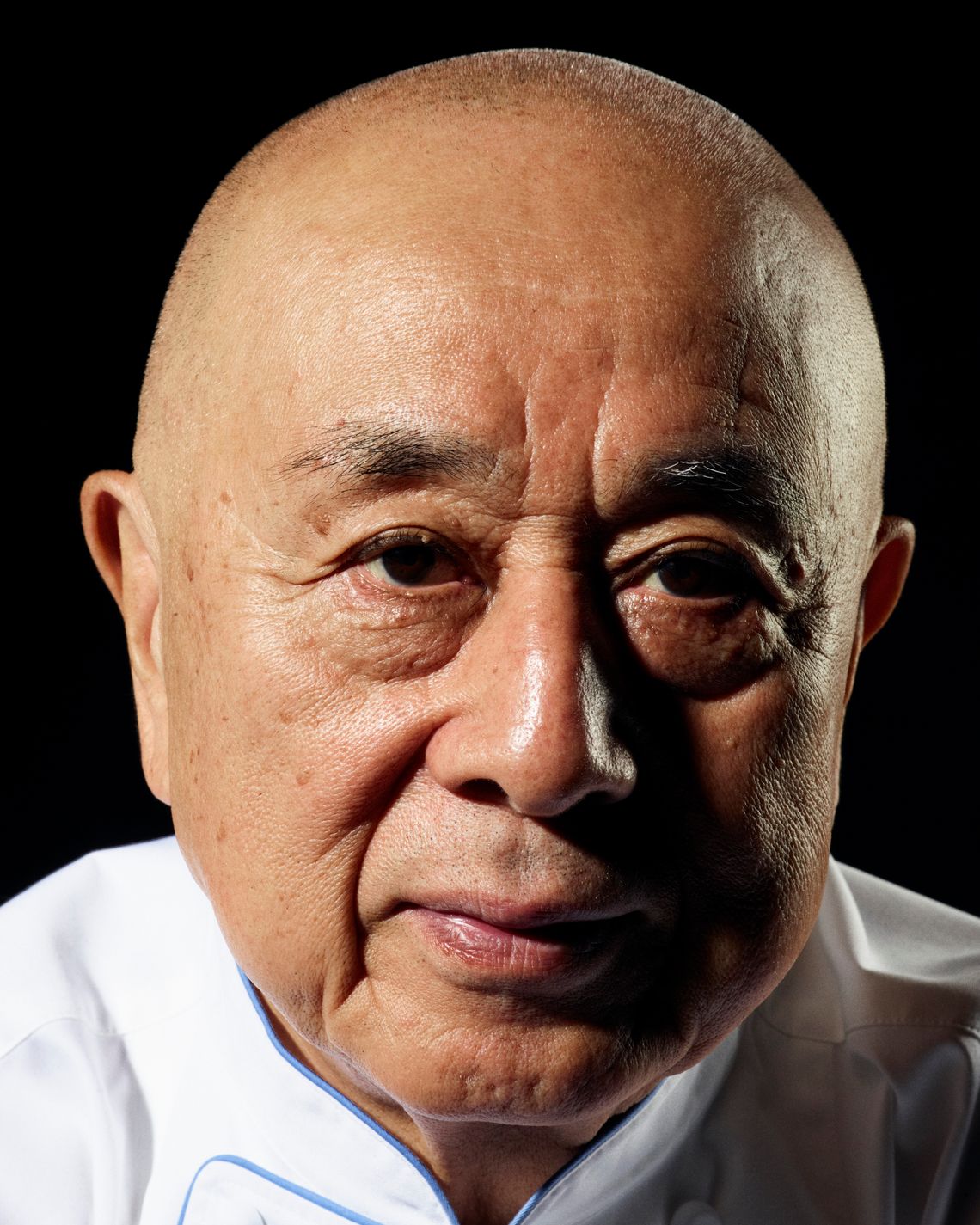when you want, where you want.
The Nobu You Don’t Know
 Photo: Hugo Yu
Photo: Hugo Yu
The Nobu backstory is restaurant-world legend: Robert De Niro spent years courting his favorite West Coast chef, Nobu Matsuhisa, in an effort to convince him to leave the popular, 38-seat restaurant he’d opened in Beverly Hills to expand eastward with a restaurant in Tribeca. Eventually, the chef could no longer refuse the actor’s efforts, and with their partners Drew Nieporent and Meir Teper, they opened the first Nobu on the corner of Hudson and Franklin Streets 30 years ago this fall. The Nobu empire now includes 57 restaurants and a line of luxury hotels, and Matsuhisa, at 75 years old, keeps a close eye on his business, visiting nearly all of his properties each calendar year. He knows how fortunate he is to be welcomed across borders and generations, since that achievement wasn’t always in his sights. The less well-known part of his biography is the decade of dire setbacks Matsuhisa faced at the start of his career: struggling with trusting business partners in Peru, Argentina, and Anchorage, Alaska, before a life-and-death existential crisis on Thanksgiving night in 1977, a subject that even today leaves him visibly shaken, and helps to explain why he was so reluctant to partner with new investors after having finally established his Los Angeles restaurant on his own terms.
You first arrived in the U.S. in Anchorage, Alaska, when you were 28 years old. It was 1977 and you at last found some success following a string of conflicts with your earliest business partners in South America. What was that like?
After four years working in Peru, then Argentina, I wanted to work in another country one more time before returning to Japan. When I was introduced to a partner in Anchorage, I thought it was my last chance, so I went to Alaska. Anchorage was a pipeline for oil and gas, so business was very good.
But it didn’t take long for problems to emerge.
I took my first day off 50 days after the restaurant opened that October. It was the last Thursday in November, Thanksgiving. I was celebrating my opening at a friend’s house with my family, with beer and turkey, when my business partner called me and told me I should come back to the restaurant. I told him, “No, today is a restaurant holiday.” Then he said a fire had started at the restaurant, and I told him, “This is a national holiday — no time to joke!”
Anchorage is a very small town with not many high buildings. It’s very dark at night, especially during holidays when everywhere is closed. I went outside and I could see the fire and the smoke in the middle of downtown, in the middle of the night. A friend of mine had a car but we could not get close, so I watched from outside the car, this big fire in front of me. At this moment it was all gone, including my dreams, my passions.
I’d lost everything and from that moment I am only thinking, How do I kill myself? I’m thinking, Go to the mountain, jump in the ocean, jump in front of a train. My wife and two kids had just come over from Japan, and I just sat at home, drinking; I couldn’t eat. I couldn’t do anything. I was still thinking, How can I kill myself?, until one moment. I have two daughters, who were 3 years old and 6 months old at that time, and they surrounded me in my apartment.
They were so happy because their father was home. In this moment, the kids are screaming — playing — and this sound wakes me up and I tell myself I am selfish to think about killing myself, that I have to challenge myself one more time, step by step.
Did it become easier for you to communicate your depression after processing your emotions about the fire?
I was very slow to wake up. My business partner was also very upset by the fire, and now I have to go back to Japan. I have no choice, because of my work visa. I also have no money. A friend of mine, a Japanese airline pilot, bought the tickets for my wife and two children, for $500, and when I went back to Japan and called friends, they didn’t want to speak to me. They didn’t want to see me, because they thought I wanted money from them, but I just wanted to talk.
Only one friend supported me, allowed me to stay at his home with his family. He talked to me and gave me advice, and I appreciate him so much for that. He died by suicide in 2017. I was so shocked, because he was the one friend to support me in life after Alaska. I have so much guilt that I could not do anything to save him, but maybe I could have. I’ve changed my mind about how I talk to people, because a lot of people supported me, they know I’m here. I’m 75 years old now, and with all the businesses and restaurants we have, I have to support them back.
There’s still so much stigma today about chefs opening up about depression, about how they internalize their feelings at home and in the workplace, to the point where depressed or angry chefs are a common trope in popular culture, in television shows like The Bear.
I don’t watch this show, but I understand what you’re asking.
If you have a mental problem I can talk to you, and I can give you advice, but you must change yourself. I can support you, but you must wake yourself up.
I still believe I have to do the work myself — I have to do it. In talking about my own story, if somebody asks me, I can speak to it, but I never volunteer it.
 Photo: Hugo Yu
Photo: Hugo Yu
After the early experiences, how did Robert De Niro come to gain your trust?
Bob invited me to New York. He showed me a building he bought in Tribeca. He showed the whole building, and he said, “This is my office, this is my screening room, this is your restaurant.” He shared his dream of Nobu with me. “I want you to make your new restaurant here.”
I stayed four days with Bob, he showed me all around New York City, and finally I told him “no.” I was worried I had not organized my first restaurant, Matsuhisa; I told him I had been in Peru and Alaska, and these two partnerships were not good relationships, so I didn’t want any more partners in my restaurants. I said no thank you, but he kept coming to my restaurant until one day he called me at my home. “Nobu what are you doing? Nice review in the New York Times. I’ve been looking at you, building your team, so maybe you come to New York again.”
I had forgotten all about his original offer; I was busy. But he had been watching me for four years, and I realized I could trust him. Usually partnerships are not good. In the beginning, I didn’t know what he could do besides him being a star, but when Nobu opened, he gave me the opportunity to learn; he gave me a challenge that turned to success.
He trusted me 100 percent. He offered great support and he still does. Last week we spent five days in Bangkok, and still he supports me. Nobu is my food, but behind Nobu is Bob De Niro. People come because they love him, too, but he never gets involved like that. He supports the business and makes it grow.
Do you have that level of trust with new people who enter your life today?
I’m a chef. I trust people who know how to cook and use product properly. I appreciate farmers and fishermen. I appreciate our vendors. I trust people who don’t waste. I watch people cook. You get a feel for people who go the easy way or go through the process.
Did you have any mentors who helped you come into your own as a chef, or to step out beyond the kitchen?
My first real mentor was Tadayuki Nakane, owner of Matsuei Sushi in Shinjuku. I was 18. I didn’t know anything. I didn’t know how to make rice, cut fish. It was a technical mentorship. He taught me to stand at the counter and if a customer asks a question it has to be answered, that we can recommend a dish, but we don’t talk too much. We make the food but we don’t interrupt. We listen but we don’t say anything because the sushi bar is a sacred place and we want to maintain privacy.
When I moved to Los Angeles, I met Wolfgang Puck who is the same age that I am. He created California cuisine, was a great chef, a great personality, but after he cooked, he would go see the table. The first time I went to Spago and met him, I thought, Wow, this guy is so nice, people are so happy to talk to the chef, he’s making guests happy. Seeing this, I was inspired by him. Japanese chefs never say hi, even now, if someone asks me, only then will I go out and greet them, but Wolfgang was always drinking and talking.
You’re likely a mentor now as well.
I don’t want to say I’m a mentor. While I’m traveling, I will talk to young chefs, the next generation. Some days they ask me questions, but I don’t want to push too much. I just put the key in the door, and they must open the door and go through on their own.
They are all looking for the next step, but the next step is not for everyone. Only if people are passionate and communicate can they go forward. Sometimes the stage is too big for them, and this is natural.
If you are in crisis, please call the National Suicide Prevention Lifeline at 800-273-8255 for free, anonymous support and resources.
All Rights Reserved. Copyright , Central Coast Communications, Inc.